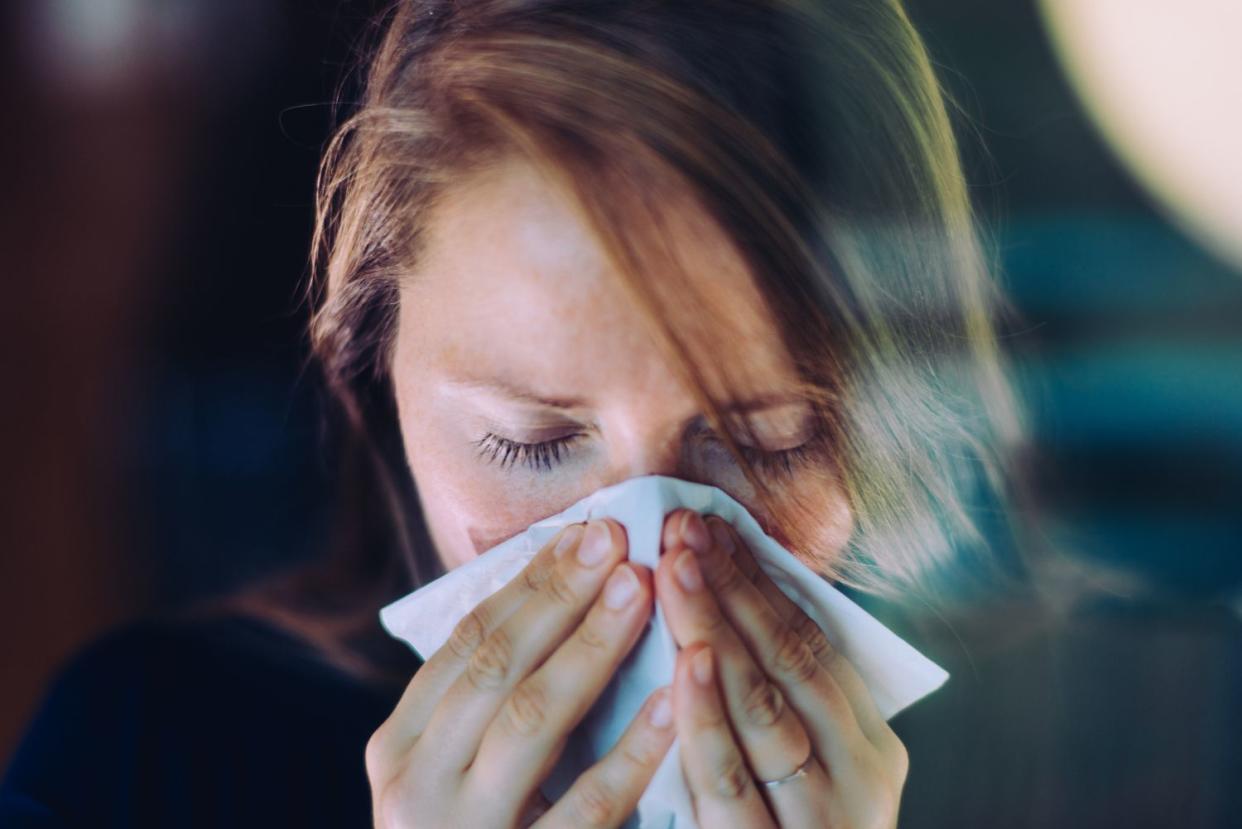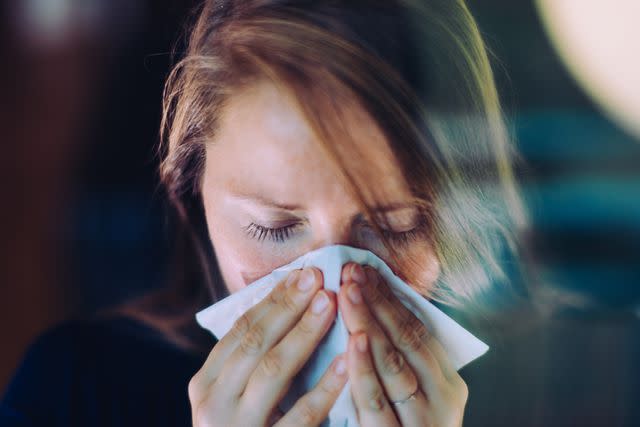Rhinorrhea (Runny Nose)

Guido Mieth / Getty Images
Medically reviewed by Benjamin F. Asher, MD
Rhinorrhea is the medical term used to describe a runny nose. It refers to the discharge of thin mucus fluid from nasal tissues as a result of allergies, infections, cold temperatures, and certain drugs or irritants.
The treatment of rhinorrhea is usually not necessary since it will clear on its once the underlying condition is resolved. Even so, some cases may benefit from saline drops or nasal sprays that stop or slow the production of nasal mucus.
This article describes the symptoms and causes of rhinorrhea. It also discusses possible treatments for a runny nose and when it is time to see a healthcare provider.

Guido Mieth / Getty Images
Symptoms of Rhinorrhea
Nasal mucus is important as it traps debris that enters the nostrils and provides a barrier against irritants and infection. Rhinorrhea occurs when excessive amounts of mucus are produced by mucosal tissues lining the nasal passages.
Some of this mucus can run out of the nostrils, while some may back up into the nasal passages and block airflow. Both nostrils are involved in most cases.
When this happens, it can cause:
A runny nose
Constant sniffing
Mouth breathing
Throat pain or irritation
Nostril redness and irritation
Causes of Rhinorrhea
Rhinorrhea occurs when the mucous membranes of the nose are either inflamed or irritated. This can directly or indirectly affect mucus-producing cells called goblet cells.
Inflammation can occur in response to an infection or allergies. When the nasal passages are affected, it can overstimulate goblet cells, causing them to produce more mucus than normal.
When exposed to irritants, goblet cells will produce more mucus to help clear the irritant. Certain drugs and environments can also activate goblet cells.
Some of the most common causes of rhinorrhea include:
Indoor allergies to pet dander, dust mites, and others
Respiratory viruses like the common cold, flu, or COVID-19
Cold temperatures (cold-induced rhinorrhea)
Sinusitis (sinus infection)
Noxious household fumes (such as from lye cleaners or radon)
Industrial chemicals and fumes (occupational rhinitis)
Aerosolized chili (capsaicin) or other hot spices
There is also a condition called vasomotor rhinitis in which a person develops nasal stuffiness and runny nose for no apparent reason. It sometimes occurs with intense exercise or hormonal changes such as pregnancy.
Severe head trauma can also cause fluids to leak from the membranes surrounding a brain into the nasal passages, causing a runny nose (typically in one nostril). Referred to as a cerebrospinal fluid leak, the condition is very serious and can also cause headaches, nausea, and a loss of balance.
What Medications Can Cause a Runny Nose?
Some oral medications can also cause rhinorrhea. They do so by affecting the autonomic nervous system that directs involuntary functions, including how glands and blood vessels work.
These medications include:
If you experience a persistent runny nose while taking any of these drugs, let your healthcare provider know. There may be other drugs you can be switched to that won't cause this problem.
Certain recreational drugs, like cocaine and crystal methamphetamine, also can cause rhinorrhea.
Are There Tests to Diagnose a Runny Nose?
Rhinorrhea is a symptom of an underlying condition like an allergy or infection. As such, the diagnosis would involve an investigation of possible underlying causes.
Based on a review of your medical history and a physical exam, your healthcare provider may order tests and procedures to narrow the possible causes, including:
Complete blood count (CBC) to check for signs of infection
A nasal swab to detect infections like COVID-19
Allergy tests, including a skin prick test and blood test
Nasal endoscopy, using a flexible scope inserted through a nostril to view the sinuses
Computed tomography (CT) scan to check for cerebrospinal fluid leak
How to Treat Rhinorrhea
Rhinorrhea typically clears when the underlying condition is resolved. Even so, some chronic (persistent or recurrent) cases may need ongoing management. This includes chronic sinusitis caused by problems like deviated septum or nasal polyps.
Even acute (sudden, severe) cases of rhinorrhea may benefit from at-home, over-the-counter (OTC), and prescription remedies.
These include:
Drinking plenty of fluids: Nasal dryness stimulates mucus production. Keeping well hydrated may help ease nasal drainage.
Using a neti pot: This a container that helps irrigate (rinse) the nasal passages with sterile water or a weak saline (salt) solution.
Trying a saline nasal spray: Available over the counter, these non-medicated sprays draw excess moisture from swollen nasal tissues.
Using a decongestant nasal spray: These OTC work by reducing the swelling of blood vessels in the nostrils, but are used no more than two to three days to avoid a rebound of symptoms.
Trying a nasal steroid spray: Available over the counter, drugs like Flonase (fluticasone) help reduce inflammation in the nasal passages.
Using antihistamines: If your symptoms are related to seasonal or indoor allergies, OTC drugs like Claritin (loratadine) or Zyrtec (cetirizine) may be all that is needed to relieve a runny nose.
Taking prescription drugs: Antibiotics may be prescribed if you have severe sinusitis. Certain antivirals may reduce the severity of flu or COVID-19 if started early.
Warning to Parents
Always consult a pharmacist or healthcare provider before using over-the-counter medications in kids with a runny nose. Children under 2 should never be given cough & cold medicines as they may cause severe and potentially dangerous side effects due to their smaller size.
When to See a Healthcare Provider
You should see a healthcare provider for rhinorrhea if you have:
A runny nose only in one nostril
Nasal discharge after a head injury
A runny nose that gets progressively worse
High fever with chills
Severe sinus pain
A greenish, foul-smelling nasal discharge
Shortness of breath or difficulty breathing
Summary
Rhinorrhea, or a runny nose, is very common and has many potential causes. Colds, flu, COVID-19, sinus infections, and allergies are among the most common explanations.
Rhinorrhea using clears on its own when the underlying cause is treated. In people with chronic rhinorrhea or acute symptoms, over-the-counter nasal drops or antihistamines may help.
Rhinorrhea is usually not serious. You should see a healthcare provider if symptoms are severe or your runny nose is getting worse.

